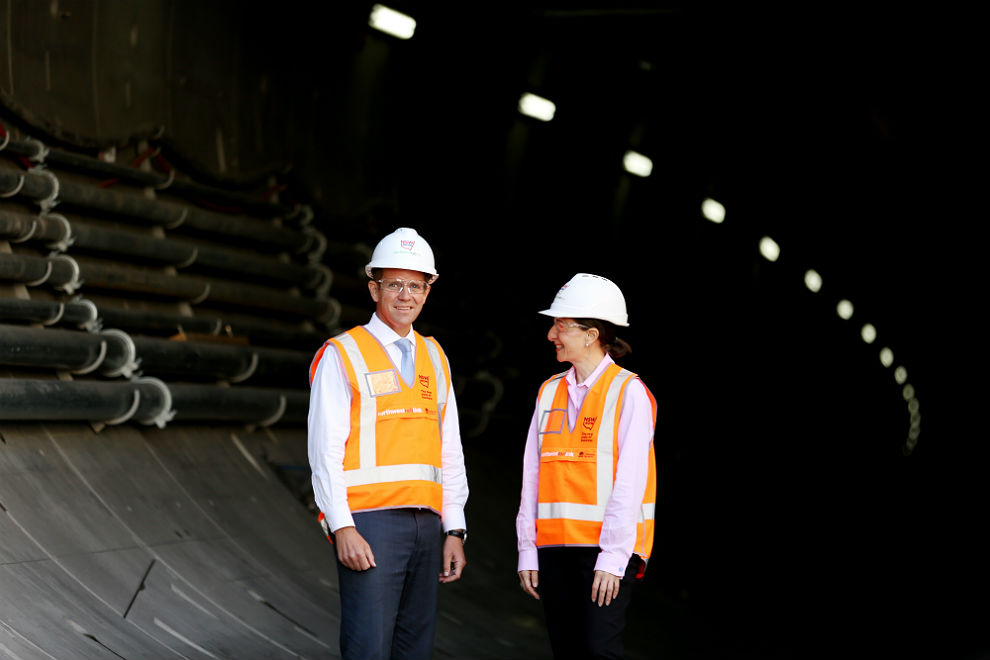Politics is a fickle business. The rollercoaster ride of popularity is notorious for having more downs than ups – and both gravity and harsh reality dictate that no one can ride the crest of a wave other than transiently.
Mike Baird, as New South Wales premier, was for a time that rare bird in the hurly-burly of Australian politics, a poster boy who, seemingly, could do little wrong and with whom his political opponents struggled to find serious fault. Premier since 2014, after Barry O’Farrell self-immolated over a bottle of wine, the straight-talking Baird became far and away the most popular leader in the land. Some Liberals even speculated on a bright future in Canberra should he eventually tire of running Australia’s biggest state.
Now, less than three years after taking the reins, he is retiring to deal with serious family health issues. While no one doubts the sincerity of his motives, there can be little argument that the best years of Mike Baird’s premiership, for all its brevity, had receded.
The dramatic decline in his approval rating late last year was the biggest drop for any premier in the history of Newspoll. In early December, his approval rating was just 35 per cent, a fall of four percentage points since September and a dramatic drop from a year earlier, when he commanded 61 per cent satisfaction.
The former investment banker came into the job as a compromise candidate when O’Farrell fell on his sword. He was a nominal moderate but his strong Christian beliefs (he had once contemplated becoming an Anglican priest) made him acceptable to the party’s religious right. So, too, did his opposition to embryonic stem-cell research, euthanasia, and same-sex marriage and adoption. He is, however, strongly in favour of Australia’s becoming a republic.
While the right could not get one of its own candidates up three years ago, it was determined to block the run of Gladys Berejiklian, who was seen, unlike Baird, as a factional warrior. She is now favoured to succeed Baird, which might yet spark further factional skirmishes in an already tense NSW Liberal Party. Berejiklian, far and away the government’s best performer, has consolidated her reputation as treasurer, and many on the right may be persuaded that her public appeal best suits her to lead the party into the next election in 2019, probably with the right’s Dominic Perrottet, the finance minister, as deputy.
At the helm, Mike Baird presented as a reasonable man who did not criticise his opponents merely for the sake of criticism and cheap point-scoring, and who even, at times, conceded merit in their views. He was fond of quoting the Liberal Party’s founder, Robert Menzies, when he said that a political leader’s role was to convince people of the arguments in favour of policies, even if they were initially unpopular.
Somewhere along the way, though, Mike Baird, the great consensus man, began to take on traits that some colleagues saw as increasingly authoritarian; some even said that he was losing touch with the electorate.
His unexpected decision to ban greyhound racing in the state caught many of his colleagues off guard; certainly the junior coalition party, the Nationals, were blindsided. It was indeed, in the memorable words of Sir Humphrey, “courageous,” but as politically foolish as foolish can be. The Nationals were in turmoil as their electorates rebelled, triggering a record swing against the party in a rural by-election and destroying the leadership of deputy premier Troy Grant. Even some Liberals expressed their opposition publicly.
Perhaps even worse, the all-powerful Sydney commercial radio shock jocks, especially Ray Hadley, mounted a campaign against the decision. In the blink of an eye, an influential medium with a deep reach into the conservative electorate had turned implacably hostile. The backflip on the decision was perhaps politically necessary, but it was also profoundly embarrassing. It prompted the inevitable questions about the self-styled conviction politician: how deep is the conviction and what price expediency?
Like water flowing downhill, crisis inevitably begets crisis. The greyhound anger fed into the simmering discontent sparked by highly unpopular local government amalgamations, and the backlash from urban lockout laws, aimed at stemming late-night drunken rowdiness, soon joined the flow, as did the long-running power privatisation controversy. Baird suddenly looked like a man under siege; he no longer looked in control.
Certainly, the state economy was burgeoning, making it the fastest-growing and most robust in Australia. And the decision to press ahead with light rail expansion, despite the inevitable short-term inconvenience of traffic disruption, was another positive.
And yet the stresses and strains of running New South Wales, arguably the second-toughest job in Australian politics, continued to take their toll. With the century little more than a decade-and-a-half old, Bob Carr, Morris Iemma, Nathan Rees, Kristina Keneally, Barry O’Farrell and now Mike Baird have all departed, with few if any of them having had time to create a legacy to bequeath.
Mike Baird, just forty-eight, leaves politics at a time most politicians are just starting to exert an influence. Whatever his shortcomings, he will be remembered as a decent man, untouched by the corruption that engulfed both sides of NSW politics in recent years. •




